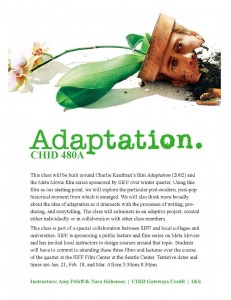Why Adaptation?
 Last year, we were approached by the Seattle International Film Festival to partner with them on a film series. We would teach a class, they would show films, and our students would get to be part of both. Cool, right?
Last year, we were approached by the Seattle International Film Festival to partner with them on a film series. We would teach a class, they would show films, and our students would get to be part of both. Cool, right?
The SIFF film series was on “meta-films”: movies about making movies. So we chose to center our class around the 2002 Spike Jonze/Charlie Kaufman film Adaptation. We spent the quarter watching and reading lots of different things, from Michel Foucault to Iranian New Wave film.
For our 2014 version of the course, we decided to break away from the post-modern world of Jonze and Kaufman and instead explore three core narratives that we found interesting, troubling, or inspiring (or all three): Shakespeare’s iconic play The Taming of the Shrew, Helen Gurley Brown’s 1960s advice book Sex and the Single Girl, and Sir Arthur Conan Doyle’s Sherlock Holmes. Through each of these stories and their numerous adaptations, plus some carefully-chosen theoretical readings, we explored the ideas of narrativity, authorship, historical contexts, genre, storyworlds, and fandom. And we discovered many of the profound and innumerable ways that these stories have touched our lives and the lives of other audiences.
Why adaptation? Because the stories we retell matter. In the words of Thomas King, “the truth about stories is that that’s all we are.”